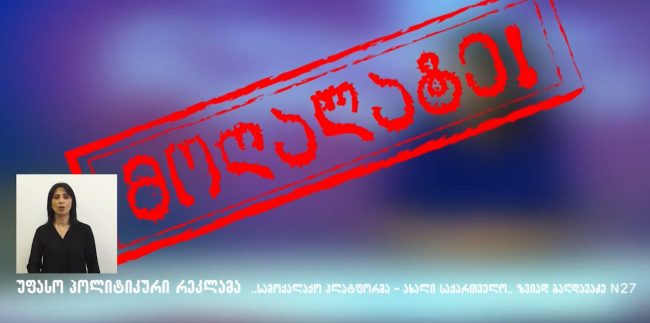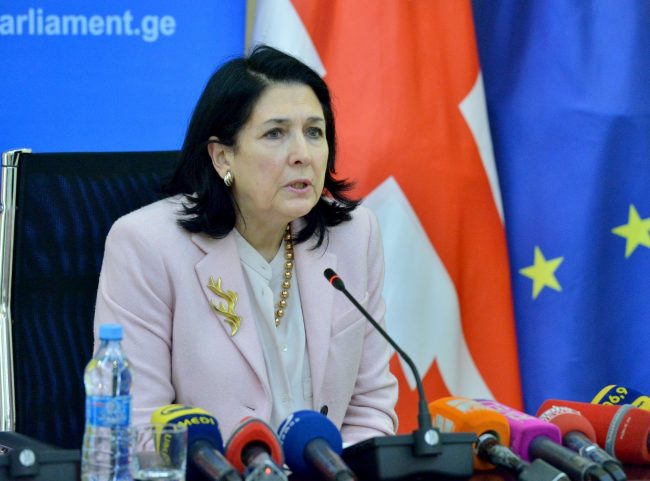

 Georgia’s National Communications Commission (GNCC) has ordered broadcasters to stop airing three attack ads aimed at presidential candidate Salome Zurabishvili. The commission told broadcasters the adds, one of which calls Zurabishvili a traitor, violate Georgian legislation.
Georgia’s National Communications Commission (GNCC) has ordered broadcasters to stop airing three attack ads aimed at presidential candidate Salome Zurabishvili. The commission told broadcasters the adds, one of which calls Zurabishvili a traitor, violate Georgian legislation.
On Tuesday, Tamta Muradashvili, a lawyer for opposition-leaning TV channel Rustavi 2, published a letter the station received from the commission on Facebook. The GNCC is the official body regulating broadcast and electronic communications in the country.
The letter, signed by the GNCC head Kakha Bekauri, claimed that three political ads attacking Zurabishvili that were currently being aired by several broadcasters were illegal and must be taken off the air.
Zurabishvili, a former foreign minister, is running as an independent candidate in October’s presidential election but has been endorsed by the ruling Georgian Dream Party.
Muradashvili told OC Media that the move was aimed at sheltering Zurabishvili from criticism. She added that the GNCC had never reacted to other attack ads in the past.
Irma Pavliashvili, a lawyer at local rights group the Georgian Young Lawyers’ Association (GYLA), told OC Media that the GNCC had no right to demand the political ads be removed.
She said there were other questions regarding how the commission was performing in general.
‘There are other advertisements from other candidates which are likely xenophobic, but we haven’t seen the commission react to them and ask for them to be removed’, said Pavliashvili.
What’s in the attack ads
One of the adverts concerned shows a clip of Zurabishvili saying ‘we bombed our population’, referring to Georgia’s bombardment of Tskhinvali, the capital of South Ossetia, during the August 2008 War. The advert called on voters not to elect ‘the traitor’ as commander-in-chief. In their letter to Rustavi 2, the GNCC argued that the term ‘traitor’ was insulting and therefore unethical, constituting ‘unfair advertising’, forbidden under the Georgian law on broadcasting.
Another advert includes an episode from Georgian talk show ‘Reaction’ in which Zurabishvili is asked by the show’s host why she looked down on the population. The GNCC argued that the appearance of a journalist in the video made it an ‘unfair advertisement’ under the same law, which states that journalists may not appear in adverts.
The third clip the GNCC deemed illegal showed Zurabishvili swearing, taking out of context and presented as her own words. The GNCC argued that the advertisements containing obscenity were banned, and therefore the advert should not be aired.
The three adverts put together by ON.ge
Rustavi 2 lawyer Tamta Muradashvili told OC Media the GNCC’s letter showed it was intervening in the content of the advertisements, which she said ‘means intervention in the outcome of the elections’. She said this was not the first election where attack ads were aired, but that the GNCC had never objected to them in the past.
‘They are trying to discredit Rustavi 2. They are targeting an audience which is not well-aware of the legislation’, said Muradashvili.
The GNCC issued a statement on Tuesday criticising Rustavi 2 for extending the time allotted to political advertisements.
‘This fact is especially significant given that advertisements of several qualified election subjects are directed towards anti-PR of only one presidential candidate and are aimed at avoiding her winning. These advertisements do not promote their own candidates and do not call on the electorate to vote for them’, the GNCC’s statement says.
It also said that the national television channel’s decision to significantly increase the free political advertisement time could demotivate presidential candidates from placing paid advertisements, which could negatively affect regional broadcasters and their income.

‘Despite Rustavi 2’s decision not being illegal, taking the circumstances into consideration it poses a threat to political pluralism’, the GNCC said, warning broadcasters to provide equal advertisement time for all candidates ‘to prevent discrimination’.
Risk of censorship
Irma Pavliashvili from GYLA said the GNCC had overstepped their authority by intervening in the content of the advertisements and asking broadcasters to take them off the air, ‘which is risky and may even develop into censorship’.
Pavliashvili told OC Media that the Law on Broadcasting states that broadcasters are not responsible for the content of political and electoral advertisements, but that those who place it are.
‘The Electoral Code rules that in order to meet the electoral advertisement standard, a video must indicate whether it’s commercial and should be accompanied with sign language translation. […] The Electoral Code of Georgia rules that adverts should not promote war or violence… We can see that by demanding the removal of these advertisements, the GNCC has passed its legitimacy’, said Pavliashvili.
She also questioned why the GNCC sent out the note in the form of a letter signed only by the GNCC’s head. According to her, for a decision to be legally binding it must be made by the collegium of the commission.
What happens if broadcasters don’t remove the ads
In their letter to Rustavi 2, the GNCC said they were responding to an appeal from the Georgian Public Broadcaster and that the letter was also sent to other broadcasters in Georgia.
A spokesperson for the GNCC told OC Media that the Public Broadcaster along with two other tv channels — Imedi and TV Pirveli — addressed them to determine whether the advertisements complied with Georgian law.
‘The GNCC explained that airing these videos as a pre-election advertisement was against Georgian legislation. […] In case broadcasters don’t remove them, the commission will discuss each case of unfair advertising and will act in accordance with Georgian legislation’, the spokesperson said.
Tinatin Berdzenishvili, director of the Media and Communications department at the Georgian Public Broadcaster, told OC Media she did not know whether the channel would air the anti-Zurabishvili attack ads given that the GNCC had said they were illegal and that they would announce their decision on Thursday.






